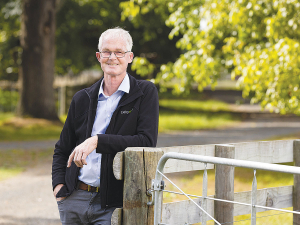DairyNZ Calls for Changes to Government’s Proposed Resource Management Act Reform
DairyNZ says the Government’s proposed Resource Management Act reform needs further work to ensure it delivers on its intent.
 DairyNZ chair Jim van der Poel says they want ETS legislation changed to take that pressure off farmers.
DairyNZ chair Jim van der Poel says they want ETS legislation changed to take that pressure off farmers.
DairyNZ chair Jim van der Poel says they are waiting patiently for the new government to be formed so they can discuss with them key issues of particular concern to the dairy industry.
He says one of these is the Emissions Trading Scheme (ETS), which is saying that agriculture will be a part of this scheme come 1 January 2025. Van der Poel says they want this legislation changed to take that pressure off farmers and so DairyNZ can work constructively on what NZ contribution will look like.
"We are keen to have a constructive discussion with the new government on that," he says.
Van der Poel says his organisation wants a change to the immigration settings which don't work well for the dairy sector. He says the present freshwater reforms are also a big problem and says a lot of presusre is on regional councils to get these done by the end of next year.
"Already we can see that councils are under so much pressure from a timeline point of view, and this is an issue.
"There is the potential risk that in their haste to ge these completed, some of their decisions won't necessarily be science based and in the end may have to be relitigated in the future. We are seeking to get a longer time so that we'll end up with better plans," he says.
DairyNZ says it fully supports the commitment of the incoming government to abolishe the present RMA. But van der Poel says DairyNZ would like to get a heads-up on what the replacement legislation might look like and to have a constructive discussion with the incoming government on the shape of any new law.
With NZ signing the Paris Accord, van der Poel says we have to meet certain obligations, but DNZ want to be sure they will end up with things that they agreed to in the past. He says they want the ETS expanded to include other forms of vegetaton that are sequestering carbon. He also says farmers need to know their number at a farm level; once they get that, there will be behavioural change.
The other issue that remains uncertain for farmers is the outcome of the Climate Change Commission review of targets. Van der Poel says getting clarity on that would be good so that farmers know what's ahead of them.
In the meantime, it's a case of waiting for a new governent to be formed, portfolios allocated and then ministers getting briefings from their departments and industry organisations such as DairyNZ.
Waiting for Fonterra
DairyNZ chair Jim van der Poel says the organisation has asked Fonterra to give it a special presentation so it has a good grasp of the details of Fonterra’s Scope 3 emissions target announced recently.
Under Scope 3, dairy farmers will have to reduce their on-farm emissions by 30% by 2030, based on a start date of 2018.
Fonterra says the target they have set has been driven by the ‘sustainability ambitions’ from its customers and financial institutions along with market access, legal and other regulatory requirements it’s facing.
Van der Poel says DairyNZ wants to have a very clear understanding of what Scope 3 will involve in practical terms for farmers. He says anecdotal evidence suggests that farmers don’t fully understand what Fonterra is proposing.
“Farmers are obviously going to come to DairyNZ for information at events that we hold, so we need to make sure we fully understand what this means so that we can give some clarity to farmers. At that point, we will produce resources that can steer farmers in the right direction and give them clarity about potentially what they can do,” he says. Van der Poel says farmers are keen to know what the benefits are from Scope 3.
Budou are being picked now in Bridge Pā, the most intense and exciting time of the year for the Greencollar team – and the harvest of the finest eating grapes is weeks earlier than expected.
The Real Estate Institute of New Zealand (REINZ) has released its latest rural property report, providing a detailed view of New Zealand’s rural real estate market for the 12 months ending December 2025.
Rural retailer Farmlands has released it's latest round of half-year results, labeling it as evidence that its five-year strategy is delivering on financial performance and better value for members.
OPINION: "We are back to where we were a year ago," according to a leading banking analyst in the UK, referring to US president Donald Trump's latest imposition of a global 10% tariff on all exports into the US.
DairyNZ says the Government’s proposed Resource Management Act reform needs further work to ensure it delivers on its intent.
Overseas Trade Minister Todd McClay says he's working constructively with the Labour Party in the hope they will endorse the free trade agreement (FTA) with India when the agreement comes before Parliament for ratification.
OPINION: Expect the Indian free trade deal to feature strongly in the election campaign.
OPINION: One of the world's largest ice cream makers, Nestlé, is going cold on the viability of making the dessert.